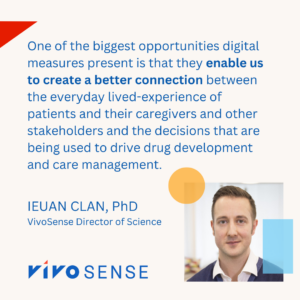In September 2022, a broad range of stakeholders representing regulators, Pharma and Biotech firms, technology service providers, innovators, and patients gathered in Zürich. This meeting, the second in a series hosted by the Swiss Federal Institute of Technology and the Foundation for the National Institutes of Health Biomarkers Consortium, sought to explore the role patient centricity must play in the development and validation of digital tools for gathering evidence. Director of Science Ieuan Clay, a member of the Biomarkers Consortium, represented VivoSense in the discussion examining four case studies of interest:

- 1. Innovative Medicine Initiative’s (IMI) Mobilise-D consortium focused on how data from wearable sensors can be used to assess patient mobility in real-world environments.
- 2. The IDEA-FAST team explored the use of digital measures in determining endpoints for the assessment of fatigue and sleep disturbance.
- 3. Roche has developed a Digital Assessment Tool (DAT) for patients living with spinal muscular atrophy (SMA) that collects data via an active smartphone-based app in addition to passive wearable sensors.
- 4. Accelerating Medicines Partnership® Schizophrenia (AMP® SCZ) used an open-source mindLAMP digital phenotyping app in the development of digital measures and tools that aid in the early detection of risk factors for psychosis.
The Digital Advantage in Data Collection
Digital measures, including endpoints from wearable sensors, sit on the cutting edge of medicine. The data captured offer incredible potential to inform and illuminate the approval of new therapies, the administration of current therapies, and the diagnostic approaches available to providers. Wearable devices afford an unprecedented chance to magnify the data available to researchers and providers alike. Expanding the arenas of data capture beyond the clinical setting improves how environmental factors and real-world conditions affect patients. The prospect of a more comprehensive understanding of patients’ lived experiences and holistic quality of life stands to benefit medicine at every level, including:
- • Speeding the development of new drugs and therapies
- • Enhancing the administration of current therapies
- • Aiding in the diagnoses of conditions
Participants explored some exciting areas where digital measures are being applied, including evaluating gait among patients with trauma and degenerative conditions, gathering data on the elusive symptoms of sleep disturbance and fatigue, and capturing indicators of impending psychosis.
The Patient Perspective: Better Trials, Better Outcomes
As these digital measures permeate ever further into patients’ daily lives, the importance of patient participation in every phase of development becomes increasingly clear. Far beyond the standard “box-ticking” approaches undertaken in many studies today, meeting participants discussed the comprehensive and innovative ways the patient voice is being considered in validation trials. Patients and their advocates offer unique and valuable perspectives that can help shape and define many aspects of study design, including:
- • Meaningfulness and applicability of data points of interest<
- • Acceptability of devices
- • Usability of interfaces
- • Feasibility of study design
Patient involvement cannot be an afterthought; planning and budgeting for patients to be heard are essential to successfully implementing digital measures in clinical trials and therapeutic care. From device selection to collection approaches and procedures, patients and patient advocates have been incorporated at all levels of these trial case studies.
As digital measures continue to develop and augment the landscape of medicine, discussions between stakeholders of all backgrounds are an important mechanism for defining their future use and promoting acceptance. VivoSense is pleased to collaborate with the Swiss Federal Institute of Technology and the Foundation for the National Institutes of Health Biomarkers Consortium in the ongoing development of digital measures to revolutionize the practice and provision of medicine.
